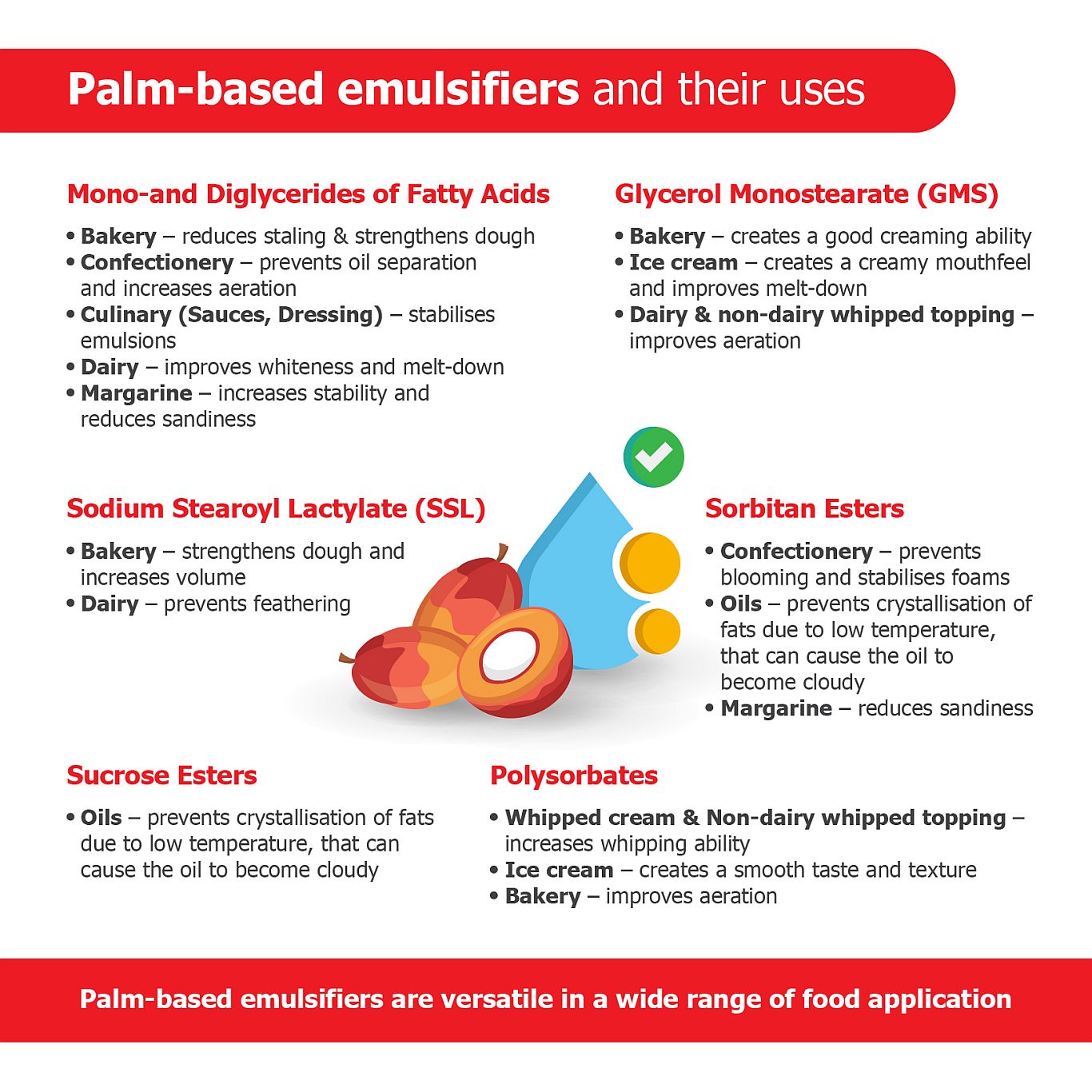How Emulsifier In Food Keeps Oil and Water Integrated Smoothly
Reveal the Advantages of Utilizing an Emulsifier in Food for Enhanced Culinary Experiences
Emulsifiers are typically ignored yet essential elements in culinary practices. They help with the mixing of disparate components, enhancing both flavor and texture. By ensuring stability, emulsifiers protect against the unpleasant splitting up of mixtures. Their flexibility covers numerous applications, from sauces to dressings. Understanding their function can bring about considerable improvements in food high quality and discussion. What specific advantages do emulsifiers supply that can transform daily recipes right into remarkable cooking experiences?
Comprehending Emulsifiers: What They Are and Just how They Function
Emulsifiers play a vital function in the food market, serving as representatives that help with the blending of water and oil, 2 substances that commonly do not mix. These compounds have both hydrophilic (water-attracting) and hydrophobic (oil-attracting) residential or commercial properties, allowing them to maintain mixtures by decreasing the surface tension in between both stages. Usual emulsifiers consist of lecithin, mono- and diglycerides, and certain healthy proteins.
When added to food items, emulsifiers create a steady solution, stopping splitting up and making sure an uniform appearance - Emulsifier In Food. They are crucial in numerous applications, varying from salad dressings and mayonnaise to ice cream and sauces. By preserving the integrity of blends, emulsifiers not just boost the aesthetic appeal of food yet additionally enhance mouthfeel and consistency. Their ability to maintain emulsions makes them vital in modern-day food formula, contributing greatly to the high quality and service life of numerous items
The Function of Emulsifiers in Flavor Enhancement
While usually overlooked, emulsifiers significantly add to flavor improvement in foodstuff. They play a vital duty in improving the overall taste experience by ensuring that flavor compounds are equally dispersed throughout a meal. By stabilizing emulsions, such as dressings or sauces, emulsifiers protect against the separation of oil and water, allowing tastes to fuse with each other better. This uniform circulation not only intensifies the taste however likewise ensures that each bite is consistently tasty.
Emulsifiers can enhance the assumption of certain tastes, making them extra noticable on the taste buds. They may connect with particular active ingredients, assisting to launch volatile taste substances that add to a dish's fragrant account. Consequently, making use of emulsifiers can significantly boost the culinary experience, transforming straightforward dishes right into complex and fascinating taste journeys. Their subtle yet impactful role in taste enhancement ought to not be taken too lightly in the art of cooking.
Emulsifiers and Structure: Producing Creamy and Velvety Dishes
The effect of emulsifiers expands beyond taste improvement to the domain of texture, where they are instrumental in creating creamy and luscious meals. By assisting in the uniform distribution of fats and water, emulsifiers enable the development of stable emulsions, leading to an extravagant mouthfeel. This is particularly apparent in products like mayo, sauces, and dressings, where a smooth, creamy consistency is desired.
Emulsifiers such as lecithin and mono- and diglycerides function to lower surface stress between ingredients, permitting a harmonious blend that enhances the sensory experience. The luscious structure achieved with emulsification can raise dishes, making them a lot more enjoyable and enticing. In addition, the capability to create a velvety texture permits cooks to incorporate different ingredients without jeopardizing consistency, causing ingenious culinary creations. Basically, emulsifiers play an essential function in transforming common meals into amazing cooking experiences via appearance improvement.
Stability Issues: Exactly How Emulsifiers Prevent Separation
An important element of culinary emulsifiers is their capacity to stop separation, making sure that items preserve their intended structure and appearance with time. Emulsifiers function by supporting combinations of oil and water, which naturally tend to separate as a result of differences in density and polarity. By reducing surface area stress at the oil-water interface, emulsifiers help with the development of steady solutions, enabling an this uniform distribution of components.

Common Emulsifiers in Cooking and Their Applications
Recognizing the different emulsifiers commonly utilized in cooking reveals their significant roles in improving food appearance and stability. Lecithin, stemmed from egg yolks or soybeans, is widely used in mayo and salad dressings, offering a velvety uniformity. Mustard, likewise an emulsifier, help in supporting vinaigrettes while imparting taste.


An additional popular emulsifier is xanthan gum tissue, often utilized in gluten-free baking and sauces for its thickening homes. Guar gum offers a similar function, boosting the texture of gelato and dairy items.
Mono- and diglycerides, usually found in processed foods, help enhance shelf life and keep appearance. Casein, a milk protein, is used in cheese-making and velvety sauces, contributing to a smooth mouthfeel. Each of these emulsifiers plays a crucial function in culinary applications, preventing and making certain desirable appearances separation in diverse foodstuff.
Regularly Asked Concerns
Are Emulsifiers Safe for Individuals With Food Allergies?
Emulsifiers can be secure for individuals with food allergic reactions, This Site depending on the certain emulsifier used. It is important to identify the resource of the emulsifier, as some might set off allergies in delicate people.
How Do Emulsifiers Affect the Nutritional Web Content of Food?
Emulsifiers can affect the nutritional web content of food by improving nutrition absorption and boosting structure. However, their existence might additionally water down specific nutrients, relying on the food matrix, potentially changing total dietary value.
Can Emulsifiers Be Used in Vegan Cooking?
Emulsifiers can be successfully made use of in vegan cooking, offering appearance and security to meals. Plant-based emulsifiers like lecithin, stemmed from soy or sunflower, aid blend ingredients, boosting the overall high quality of vegan culinary creations.
What Are the Environmental Impacts of Emulsifier Production?
The ecological effects of emulsifier manufacturing usually consist of logging, water air pollution, and high power usage. Furthermore, some sources of emulsifiers can add to biodiversity loss, elevating issues regarding sustainability in food manufacturing practices.
Just How Do Emulsifiers Contrast to Natural Thickeners in Cooking?
Emulsifiers use smoother structures and enhanced security contrasted to all-natural thickeners, which can give distinct tastes - Emulsifier In Food. While emulsifiers boost mouthfeel and look, all-natural thickeners provide more health benefits and can contribute to the dish's taste account
When included to food items, emulsifiers produce a stable solution, protecting against splitting up and ensuring a consistent appearance. While usually ignored, emulsifiers considerably add to taste enhancement in food products. Recognizing the different emulsifiers frequently utilized in food preparation discloses their substantial roles in enhancing food this hyperlink texture and security. Emulsifiers can be risk-free for people with food allergies, depending on the particular emulsifier utilized. Emulsifiers can influence the nutritional content of food by enhancing nutrient absorption and boosting structure.